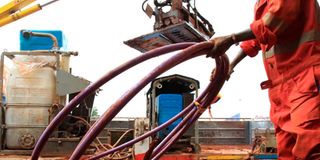Fiber optics boom makes comeback

Workers lay a fibre-optic cable.
What you need to know:
- Kenya is one of 16 countries in Africa that will be included in the new undersea fibre cable network by Facebook which goes live in 2024.
- Technology experts attending this year’s edition of the Connected Kenya Conference called for additional fibre connectivity to the country.
Airtel plans to land a new submarine internet cable in Kenya, underpinning a fresh wave of connections that is expected to raise price competition in the race for the country’s booming internet economy.
Airtel Networks Kenya has already made an application to the Communications Authority of Kenya for submarine cable landing rights.
Barely two weeks ago, Kenya welcomed its sixth submarine internet cable as a partnership between Telkom Kenya and a consortium known as Pakistan and East Africa Connecting Europe (Peace) — meaning the additional cables by Airtel and the big tech firms would underline a fresh wave off connectivity with benefits to consumers.
“This ultra-high capacity cable will assist Kenya and the region in meeting its current and future broadband capacity requirements as well as assist carriers in providing affordable services to Kenyans,” Telkom Kenya’s Mugo Kibati said during the launch.
The Sh44 billion cable connects Africa to France and Pakistan through the Europe-Asia route-- providing direct connectivity to Asia, which is expected to reduce communication delays between Africa and Asia.
The 15,000-kilometre Peace cable is expected to create more flexible digital connection options, including high speeds of 200 gigabytes per second (Gbps) per single wavelength with a total capacity of 192 Terabytes per second (TBps), as well as stable and secure data access possibilities.
Airtel Kenya in its application for submarine internet cable landing rights does not specify the consortium under which its cable would land in the country.
The application comes barely two months after its parent firm Bharti Airtel announced that it had joined the SEA-ME-WE-6 undersea cable consortium that will join Singapore and France with off branches to destinations such as the Horn of Africa.
Airtel is participating as a major investor in the 19,200-kilometre-long SEA-ME-WE-6 and is anchoring 20 percent of the overall investment in the cable system, which will go live in 2025.
Flourishing data market
The 12 other consortium members of SEA-ME-WE-6 include Bangladesh Submarine Cable Company, Dhiraagu (Maldives), Djibouti Telecom, Mobily (Saudi Arabia), Orange (France), Singtel (Singapore), Sri Lanka Telecom, Telecom Egypt, Telekom Malaysia, Telin (Indonesia).
Through SEA-ME-WE-6 Airtel will add a significant amount of 100 terabytes per second (TBps) capacity to its global network.
Tech giant Google and internet platform Facebook are also set to land two other submarine cables in Kenya as they join the scramble for the flourishing data market.
Kenya is one of 16 countries in Africa that will be included in the new undersea fibre cable network by Facebook which goes live in 2024. The 37,000 kilometre undersea network dubbed 2Africa will be built in partnership with China Mobile International, MTN GlobalConnect, Orange, STC, Telecom Egypt, Vodafone and the West Indian Ocean Cable Company (WIOCC).
“2Africa will deliver much-needed internet capacity and reliability across large parts of Africa, supplement the fast-growing capacity demand in the Middle East and underpin the further growth of 4G, 5G and fixed broadband access for hundreds of millions of people,” said a statement from Facebook announcing the 2Africa project in 2020.
Kenya launched its maiden submarine internet cable, The East African Marine System (TEAMS) in June 2009—unlocking the country’s journey towards digital transformation.
TEAMS is a 5,000-kimometre fibre-optic undersea cable, with a 5.2T of upgradeable capacity and links Mombasa with Fujairah in the United Arab Emirates(UAE). TEAMS was built as a joint venture between the Government of Kenya and local operators including Safaricom, Telkom Kenya, Wananchi Telkom, Liquid Telkom, Jamii Telkom, and BCS Group who hold a combined 85 percent shares, and UAE-based operator Etisalat, with 15 percent.
Since then, other internet cables have landed in Mombasa including the Eastern Africa Submarine Cable System (EASSy), the Lower Indian Ocean Network (LION), Seacom, and the Djibouti Africa Regional Express 1 (DARE1) which docked in 2020.
Submarine cable system
Their respective speeds are 5.2 Tbps, 12.3 Tbps, 18.6 Tbps, 12 Tbps and 36 Tbps, and all serve to deliver an exceptional amount of internet bandwidth in East Africa.
EASSy is a 10,000-kilometre submarine cable system with a capacity of more than 10 Tbps and links South Africa with Sudan via landing points in Mozambique, Madagascar, Comoros, Tanzania, Kenya, Somalia, and Djibouti.
The EASSy Consortium consists of 18 members, including Bharti Airtel, Botswana Fibre Networks, BT, Comores Telecom, Djibouti Telecom, Etisalat, Mauritius Telecom, MTN Group, Neotel, Orange, Saudi Telecom, Sudan Telecom Company, Tanzania Telecommunications Company Limited (ZANTEL), Telkom Kenya, Telkom South Africa, Telma (Telecom Malagasy), Vodacom DRC, WIOCC, Zambia Telecom.
LION is a 1,060 km long cable that is owned by Mauritius Telecom, Orange, and Orange Madagascar.
SEACOM is a 17,000 km (11,000 mi) submarine cable connecting South Africa, Kenya, Tanzania, Mozambique, Djibouti, France, and India.
The country’s broadband market holds huge potential amid a push by the State to ditigise its services and expand ICT services to rural areas.
The latest report by the regulator shows that the total available undersea bandwidth capacity stood at 10,886.2 Gbps in the three months between October and December last year against a utlisation of just 4814.43.
Technology experts attending this year’s edition of the Connected Kenya Conference called for additional fibre connectivity to the country to achieve the modest ambition of connecting at least a million students to the internet.
“Accelerating ICT infrastructure construction is critical for ensuring universal access to all. Huawei has and will continue to collaborate with our customers and partners in delivering cutting edge solutions in support of implementing the National Broadband Strategy for ensuring connectivity to all and affordable access to digital services,” Huawei, the firm’s Director for Enterprise Business, Steve Kamuya told participants at the conference.





